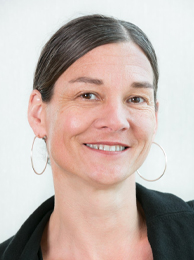Christina Gerhardt
January 2021 – May 2022 Currie C. and Thomas A. Barron Visiting Professor in the Environment and the Humanities and Visiting Professor in German and the High Meadows Environmental Institute
Biography

Christina Gerhardt is a professor and environmental journalist whose work explores how people engage the experience of sea-level rise through culture.
Her academic work focuses on the environmental humanities and environmental communications with a focus on environmental justice. Gerhardt is a senior fellow at the University of California, Berkeley, where she previously taught.
As an environmental journalist, she covers the annual United Nations climate negotiations, domestic renewable-energy legislation, hurricanes and sea-level rise. She has been published as Tina Gerhardt in The American Prospect, Grist, The Nation, The Progressive, Sierra Magazine, and Washington Monthly, among other venues.
She is editor-in-chief of ISLE: Interdisciplinary Studies in Literature and the Environment, the quarterly journal of the Association for the Study of Literature and the Environment (ASLE) published by Oxford University Press.
She serves on the editorial board of PMLA — the journal of the Modern Languages Association — the advisory board of the Journal of Environmental Media, and the editorial boards of the journal Media + Environment and the environmental humanities series at Routledge.
Gerhardt has been awarded fellowships by the Fulbright Commission, the National Endowment for the Humanities, the Newberry Library and the Rachel Carson Center. She has held visiting appointments at Harvard University, the Free University Berlin, Columbia University and UC Berkeley.
While at Princeton
In spring 2022, Gerhardt organized and initiated her principle project, High Water Line: New Jersey, a public-facing project that walked and chalked New Jersey’s future shoreline as projected by science. The core of the project was a series of walking tours in Sayreville, New Jersey, that outlined the city’s future shoreline to demonstrate the threat of sea-level rise facing the state’s low-lying coastal and riverside communities — and show how people are responding to the effects of climate change they face already. A series of expert panels on Princeton’s campus engaged the public in understanding the impacts of sea-level rise on New Jersey.
In spring 2021, Gerhardt taught the undergraduate course “Sea-level Rise, Islands and the Environmental Humanities,” which dovetailed with the book project she completed while in residence at Princeton, “Sea Change: An Atlas of Islands in a Rising Ocean” (University of California Press, 2023). The course focused predominantly — but not exclusively — on Caribbean and Pacific islands. It presented the impacts of, and solutions to, sea-level rise. Students in the seminar learned about the history and culture of impacted islands and why knowledge of inequities is important for environmental engineering and environmental policy.
In fall 2021, Gerhardt taught the course “Cities, Sea-level Rise and the Environmental Humanities,” which explored the impacts of sea-level rise on urban infrastructure and how these impacts exacerbate already existing inequities. The course considered solutions that might address these inequities in addition to climate change-induced sea-level rise. Gerhardt taught each course again in spring 2022.
In fall 2021, Gerhardt presented the HMEI Faculty Seminar, “Atlas of Islands in a Rising Ocean,” which focused on her book project. Scheduled for publication in 2023, the book combines geography and cartography, literary studies and creative non-fiction, and environmental studies and environmental humanities to examine the impacts of climate change on low-lying islands and the solutions being put forward — often by Indigenous islanders — to address them. She also presented a fall 2021 Mellon Forum lecture on the High Water Line: New Jersey project.
In November 2021, Gerhardt covered the annual United Nations climate negotiations for The Nation and Sierra Magazine and was featured on a panel about the 26th UN Climate Change Conference of the Parties (COP26) alongside Somini Sengupta of The New York Times and Fiona Harvey of The Guardian, and hosted by Andrew Revkin at the Columbia University Climate School.



